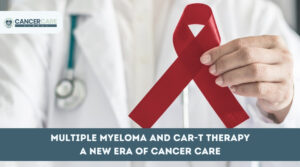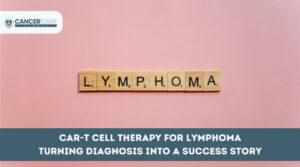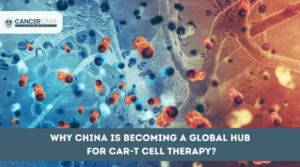Cancer treatment has come a long way, and today, the world’s most advanced therapies are nothing short of remarkable. From cutting-edge immunotherapies that supercharge the body’s immune system to target cancer cells, to precision medicine that tailors treatment based on a patient’s genetic makeup, the options are more effective and personalized than ever before.
Imagine treatments that can pinpoint and destroy cancer cells with minimal side effects or even innovative approaches like CAR-T cell therapy, which reprograms a patient’s own cells to fight cancer.This blog will explore some of the most advanced treatments available today, including CAR-T Cell Therapy, NK Cell Therapy, Stem Cell Therapy, and Alternative Medicine options.
Table of Contents
CAR-T Cell Therapy
Chimeric Antigen Receptor T-cell (CAR-T) therapy is one of the most exciting advancements in cancer treatment today. This therapy involves taking a patient’s own immune cells, reprogramming them to target cancer cells, and then reintroducing them into the body to hunt down and destroy the cancer. It’s like giving your immune system a turbo boost against cancer!
Advantages:
- High specificity for cancer cells: CAR-T cells are designed to specifically target cancer cells, minimizing damage to healthy cells and reducing side effects compared to traditional treatments like chemotherapy and radiation.
- Proven effectiveness: CAR-T therapy has shown remarkable success in treating certain types of leukemia and lymphoma, with many patients achieving complete remission.
- Potential for long-term remission: Some patients experience long-lasting remissions, suggesting that CAR-T therapy can provide durable responses.
Challenges:
- High cost: CAR-T therapy is expensive due to the complex manufacturing process and the need for individualized treatment. This makes it less accessible to many patients.
- Severe side effects: Patients may experience cytokine release syndrome (CRS) and neurotoxicity, which can be life-threatening if not managed properly.
- Limited availability: CAR-T therapy is currently approved for only a few types of cancer, and more research is needed to expand its use to other cancers.
NK Cell Therapy
Have you heard about NK Cell Therapy? It’s a pretty fascinating and emerging treatment in the medical world. NK stands for Natural Killer cells, which are a type of white blood cell that plays a crucial role in the body’s immune response. They’re like the body’s first line of defense, always on the lookout for virus-infected cells and cancer cells to attack and destroy.
Benefits
One of the standout benefits of NK Cell Therapy is its potential in treating cancer. Since NK cells are naturally designed to target and kill abnormal cells, harnessing and boosting their power can be incredibly effective. Here are some key benefits:
- Targeted Action: NK cells are particularly good at identifying and destroying cancer cells while leaving healthy cells alone. This targeted action can reduce the side effects often associated with traditional cancer treatments like chemotherapy and radiation.
- Boosts Immune System: NK Cell Therapy can enhance the overall function of the immune system, providing a stronger and more efficient response to cancer cells and other pathogens.
- Potential for Personalized Treatment: This therapy can be tailored to individual patients, improving its effectiveness. By cultivating and expanding a patient’s own NK cells, the treatment can be customized to their specific needs.
Challenges:
- Limited clinical data: While NK cell therapy shows promise, it is still in the early stages of clinical development, and more research is needed to establish its efficacy and safety.
- Optimization needed: Scientists are working to improve the persistence and effectiveness of NK cells in patients, as they tend to have a shorter lifespan compared to other immune cells.
Stem Cell Therapy
Stem Cell Therapy for cancer involves using stem cells to repair or replace damaged tissues and boost the patient’s immune system. This can include autologous stem cell transplants (using the patient’s own cells) or allogeneic transplants (using donor cells).
Advantages:
- Restoration of bone marrow: Stem cell transplants can restore the bone marrow after high-dose chemotherapy, allowing patients to recover more quickly and reducing the risk of infections.
- Improved immune function: Stem cells can help rebuild the immune system, providing better protection against infections and potentially reducing the risk of cancer relapse.
- Ongoing research: Researchers are exploring ways to combine stem cell therapy with genetic engineering and other treatments to enhance its effectiveness against cancer.
Challenges:
- Risk of graft-versus-host disease (GVHD): In allogeneic transplants, donor stem cells may attack the patient’s tissues, leading to GVHD, which can be life-threatening if not managed properly.
- Intensive preparatory treatment: Patients must undergo high-dose chemotherapy or radiation to prepare for a stem cell transplant, which can be physically taxing and carry significant risks.
- Limited availability: Stem cell therapy is primarily used for blood cancers, and more research is needed to expand its use to other types of cancer.
Alternative Medicine
In addition to conventional therapies, many patients explore Alternative Medicine for cancer treatment. These methods can include dietary supplements, herbal remedies, acupuncture, and mind-body practices such as yoga and meditation.
Advantages:
- Improved quality of life: Alternative medicine can help alleviate side effects of conventional treatments, such as pain, fatigue, and nausea, improving overall quality of life for cancer patients.
- Holistic approach: These therapies often focus on the whole person, addressing physical, emotional, and spiritual needs, which can enhance the patient’s well-being and support healing.
- Psychological and emotional support: Practices like meditation and yoga can reduce stress and anxiety, providing psychological and emotional benefits that complement conventional treatments.
Challenges:
- Lack of rigorous scientific evidence: While many alternative therapies show promise, there is often limited scientific evidence to support their efficacy in treating cancer.
- Potential interactions: Some dietary supplements and herbal remedies can interact with conventional treatments, potentially reducing their effectiveness or causing harmful side effects.
- Need for careful consideration: Patients should discuss any alternative therapies with their healthcare providers to ensure they are safe and compatible with their conventional treatments.
The landscape of cancer treatment in 2024 is marked by incredible advancements and diverse approaches. CAR-T Cell Therapy, NK Cell Therapy, Stem Cell Therapy, and Alternative Medicine each offer unique benefits and challenges, highlighting the importance of personalized and integrative care in oncology. As research continues to evolve, these therapies represent the cutting edge of hope and innovation in the fight against cancer.







